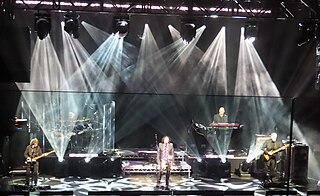
Marillion are a British rock band, formed in Aylesbury, Buckinghamshire, in 1979. They emerged from the post-punk music scene in Britain and existed as a bridge between the styles of punk rock and classic progressive rock, becoming the most commercially successful neo-prog band of the 1980s.

Derek William Dick, better known by his stage name Fish, is a Scottish singer-songwriter and occasional actor.
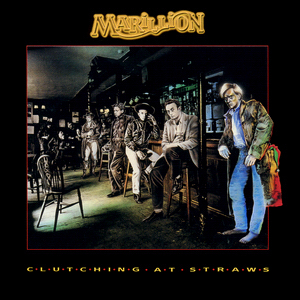
Clutching at Straws is the fourth studio album by the British neo-prog band Marillion, released on June 22, 1987. It was the last album with lead singer Fish, who left the band in 1988, and is a concept album.

Misplaced Childhood is the third studio album by the British neo-prog band Marillion, released in 1985. It is a concept album loosely based on the childhood of Marillion's lead singer, Fish, who was inspired by a brief incident that occurred while he was under the influence of LSD.
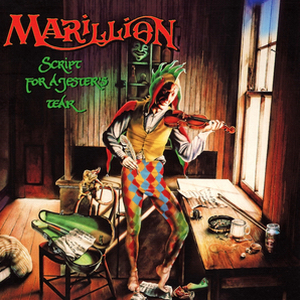
Script for a Jester's Tear is the debut studio album by British neo-prog band Marillion, released in the United Kingdom on 14 March 1983 by EMI Records. The album reached number seven and spent 31 weeks in the UK Albums Chart, eventually achieving a platinum certificate, and produced the Top 40 single "He Knows You Know" and the Top 20 single "Garden Party".
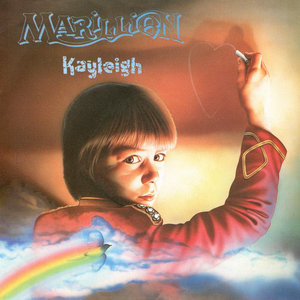
"Kayleigh" is a song by the British neo-prog band Marillion. It was released as the first single from the concept album Misplaced Childhood. It was the band's most successful single in the UK, where it peaked at number-two and stayed on the chart for a total of 14 weeks. It also became the band's most successful single worldwide, reaching the top 10 in the Republic of Ireland, Norway and France and became the band's sole appearance on the United States Billboard Hot 100, hitting number 74 in October 1985.
Mark Wilkinson is an English illustrator. He is best known for the detailed surrealistic cover art he created for a number of British bands.

Seasons End is the fifth studio album by British neo-prog band Marillion, released in 1989. The album was the first to feature current lead vocalist Steve Hogarth, following the departure of former vocalist Fish in late 1988. It reached number 7 on the UK Albums Chart.

Made Again is a 1996 double live album by Marillion, their first live recording with singer Steve Hogarth. The first disc contains material recorded in London on the Holidays in Eden tour (1991) and in Rotterdam on the Afraid of Sunlight tour (1995); the second disc consists of a full live version of the album Brave recorded in Paris in 1994. Outside of the UK, distribution would be handled by the then independent record label Castle Communications, who would also release the band's next three studio albums.

Best of Both Worlds is a two-disc compilation album by British neo-prog band Marillion released in 1997 by EMI Records, who the band had been signed to from their debut in 1982 until being dropped in 1995. The title refers to Marillion's two distinct "eras" with lead singers Fish (1980—1988) and Steve Hogarth. By the time this compilation was released, both line-ups had recorded four studio albums each. The second best-of since the 14-track one-disc compilation A Singles Collection from 1992, this one additionally contains material from Brave (1994) and Afraid of Sunlight (1996). Two different covers were created for the compilation, one by Mark Wilkinson, who had worked for the band during the Fish years, and one by Bill Smith Studio, who took over after Fish's and Wilkinson's departure. The booklet was printed so that either of the covers could be displayed in the jewel case according to personal preference. The track list, comprising 29 songs, was put together by Lucy Jordache, then the manager responsible for the band in EMI, in close collaboration with the band's fans' mailing list, "Freaks". Jordache also motivated singers Fish and Hogarth to contribute liner notes—at a time when both camps were not yet on friendly terms again—by telling each of them the other had already agreed to do so.

B'Sides Themselves is a compilation of single B-sides by the British neo-prog band Marillion, which was released on CD only in January 1988. This was the first time that those B-sides were made available in the then still relatively new Compact Disc format. However, vinyl LP and cassette versions were issued in June 1988.

The Thieving Magpie (La Gazza Ladra) is a double live album by the British neo-prog band Marillion. It was named after the introductory piece of classical music the band used before coming on stage during the Clutching at Straws tour 1987–1988, the overture to Rossini's opera La gazza ladra, which translates as "The Thieving Magpie". The album was released shortly after singer Fish's departure from the band (and before Steve Hogarth's arrival) and was intended to document the "Fish years". It complements the band's first live album Real to Reel insofar as there are no overlaps. The Thieving Magpie is not a continuous live recording, but a compilation of tracks recorded at different times and places, with audible gaps between them and different moods on the individual tracks. However, the double vinyl version does include the first side of the UK number one concept album Misplaced Childhood (1985). The CD and cassette version includes the full album, as well as the track "Freaks" – originally the b-side to "Lavender", it was used as the lead single for The Thieving Magpie peaking at no. 18 in the UK.

"Lavender" is a song by the British neo-prog band Marillion. It was released as the second single from their 1985 UK number one concept album Misplaced Childhood. The follow-up to the UK number two hit "Kayleigh", the song was their second Top Five UK hit, entering the chart on 7 September 1985, reaching number five and staying on the chart for nine weeks. None of the group's subsequent songs have reached the Top Five and "Lavender" remains their second highest-charting song. As with all Marillion albums and singles between 1982 and 1988, the cover art was created by Mark Wilkinson.

Brief Encounter is a compilation EP by the British neo-prog band Marillion. It contains two studio and three live tracks that EMI's American label Capitol Records released there in 1986, coinciding with the band's tour of the U.S. and Canada that year. The band was Rush's support act on the Power Windows tour and also played headline gigs at smaller theatres. The "mini album" contained five tracks: the band's European breakthrough single "Kayleigh" ; its b-side "Lady Nina"; "Freaks", released in Europe as the b-side of the follow-up single "Lavender"; and live recordings of the first two albums' title tracks, Fugazi (1984) and Script for a Jester's Tear (1984).

Live from Loreley is a live album by the British neo-prog band Marillion, recorded at a concert at the Freilichtbühne Loreley Loreley, St. Goarshausen, Germany on 18 July 1987. The recording, made during the first leg of the 1987 Clutching at Straws tour, documents the band at the peak of their commercial success in the 1980s when they had original frontman Fish on vocals. The show was attended by an audience of 20,000; support acts were Magnum, The Cult (cancelled), and It Bites. It comprises songs from the four studio albums they released up to that point, i.e. Script for a Jester's Tear (1983), Fugazi (1984), Misplaced Childhood (1985), and Clutching at Straws (1987). The non-album debut single "Market Square Heroes" is also included.

Early Stages is a box set containing live recordings of Marillion with their former singer Fish. The recordings were made by the BBC for radio broadcast, and are from five concerts performed by the band in the UK between 1982 and 1987. The packaging was designed by Mark Wilkinson, who had designed all Marillion covers of the 1980s and went on to work with Fish after his departure. The set was released to retail by EMI on 17 November 2008.

The Singles '82–88' is a three-CD box set containing the first twelve singles by the British neo-prog band Marillion, all from the period they were fronted by Fish. It was released by EMI Records on 16 October 2009. The musical contents is identical to the 2000 box set of the same title, which contained 12 individually packaged CD singles in "replica" mini-slip covers, each with the original cover art by Mark Wilkinson. This set re-uses a part of Wilkinson's contribution to the 1995 compilation The Best of Both Worlds for its front cover.
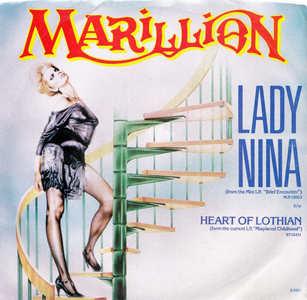
Lady Nina is a song by the British neo-prog band Marillion. First released in 1985 on the B-side to the #2 UK hit single "Kayleigh", it was the only single from the EP Brief Encounter released in the United States by Capitol Records in April 1986. A music video was also shot to promote it. While the EP climbed to #67 on the Billboard 200 album charts, "Lady Nina" did not make the Billboard Hot 100, but did reach #30 on the Mainstream Rock charts.

"Heart of Lothian" is a song by British neo-prog band Marillion. It is the fifth track on the 1985 concept album Misplaced Childhood. The song was released as the third single from Misplaced Childhood on 18 November 1985 in the UK, the Netherlands, West Germany, Canada, South Africa and Australia. "Heart of Lothian" became the third Top 30 UK single from Misplaced Childhood, peaking at number 29. The song also peaked at number 51 on the German singles chart.
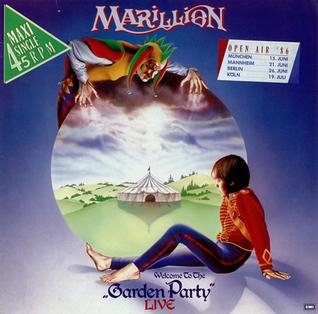
"Welcome to the ‚Garden Party‘" is a 1986 single by British neo-prog band Marillion released exclusively in West Germany to accompany a series of concerts the band played at festivals in that country as second bill to Queen, following their commercial breakthrough with the album Misplaced Childhood and the hit singles "Kayleigh" and "Lavender" the year before. The single was released on 7" and 12" vinyl; neither version contained any new or previously unreleased material. The 7" and 12" versions contained completely different recordings from each other. The A-side, "Garden Party", originally the second single from the band's debut album, Script for a Jester's Tear, had reached #16 on the UK Singles Chart in 1983, but—like all Marillion singles before "Kayleigh"—had failed to chart in Germany. However, the single received little airplay and failed to enter the German top 100.




















